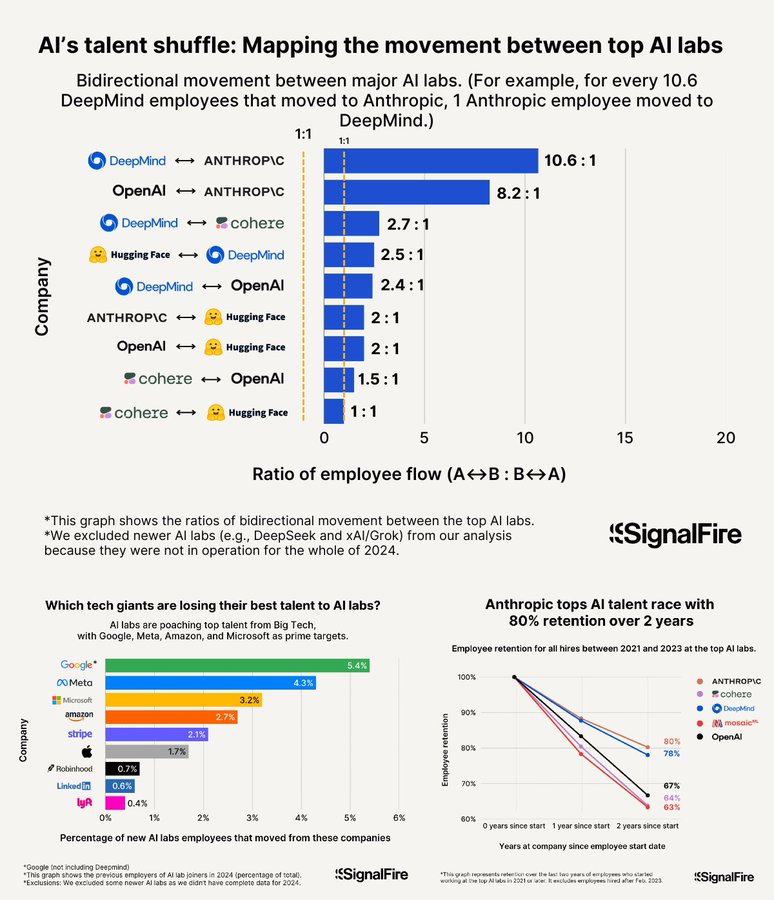
Meta CEO Mark Zuckerberg is personally recruiting artificial intelligence researchers with pay packages reaching nine figures as the company builds a secret team to achieve artificial intelligence (AI) superintelligence.
The Facebook parent company has offered seven to nine-figure salaries to dozens of researchers from leading AI companies, including OpenAI and Google, with some already accepting the offers. Zuckerberg aims to hire around 50 experts for what Meta internally calls a “superintelligence group.”
Bloomberg and The New York Times reported that Zuckerberg has hosted recruitment lunches and dinners at his homes in Palo Alto and Lake Tahoe throughout May and June.
Zuckerberg’s recruitment blitz follows a disappointing performance from Meta’s latest AI model. Llama 4 failed to impress critics or outperform rivals on industry benchmarks. The company even delayed releasing its flagship “Behemoth” model due to quality concerns.
“The AI talent wars are absolutely ridiculous,” venture capitalist Deedy Das posted on X Monday, noting Meta had lost multiple researchers to competitors despite offering more than $2 million annually.


Source: Deedy Das
Meta’s biggest hire involves 28-year-old billionaire Alexandr Wang, founder of Scale AI. The company is investing $15 billion in Wang’s AI startup, making it Meta’s largest external deal ever. Wang will join the new AI team after the deal closes.
Wang previously placed an ad in The Washington Post stating “America must win the A.I. war” and once lived with OpenAI CEO Sam Altman.
The new lab aims to achieve artificial general intelligence before advancing to superintelligence, which would exceed human thinking abilities across all tasks. Meta plans to add these abilities into Facebook, Instagram, WhatsApp, and its Ray-Ban smart glasses.
Zuckerberg created a WhatsApp group called “Recruiting Party” where senior leaders discuss potential hires. The CEO handles first contact personally and stays in regular touch throughout the hiring process.
The CEO has also rearranged Meta’s Menlo Park headquarters so new team members will sit near his desk as he adopts what sources describe as “founder mode” management.
“This year is going to set the course for the future,” Zuckerberg said in February, describing AI as “potentially one of the most important innovations in history.”
Meta’s desperation stems from recent setbacks beyond Llama 4’s poor reception. Social media rumors said the company had manipulated benchmarks to make its models appear more sophisticated than they actually were. Some developers accused Meta of trickery, further damaging its AI credibility.
The recruitment drive also follows significant talent losses to rivals like OpenAI and Anthropic. Meta’s AI division has struggled with grueling development schedules, leadership infighting, and a competitive job market that favors established players.
Meta’s advertising revenue provides financial advantages over startups that need outside funding, Zuckerberg tells potential recruits. He claims the company can fund multi-gigawatt data centers among the world’s most powerful computing systems.
However, Meta must navigate regulatory scrutiny carefully. The Federal Trade Commission recently challenged the company’s Instagram and WhatsApp acquisitions in federal court, making the Scale AI investment structure particularly sensitive.























